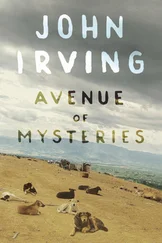• • •
Someone tapped against the middle pane of the bay window. I was on the concrete sidewalk, still halfway in front of the nextdoor neighbors. The lace curtain moved, a hand slid the sheer fabric aside. I looked into the eyes of Scotty’s mother, unmistakable — how in fact did memory work? She seemed to recognize me too: the overly made-up, skeletal face emanated delight and dismay at the same time, the pink-glossed lips moved, formed a word. I looked back: Boudewijn had Mike on his lap in the passenger’s seat. I walked across the neatly mown grass to the window, the wrinkled lips mouthed something. “Tineke.” The woman released the curtain, gestured for me not to leave. As I waited I realized that twenty years ago my mother was thin .
“Joni, dear, is that you? Good heavens … I thought for sure it was your mother. Come in, come in, what a sur prise .” Her left foot was stuck in a Stop & Shop bag fastened around her ankle with a rubber band, the right foot in a gray furry slipper. She led me into the living room, dragging that plastic foot. A sour smell took my breath away, a mix of old wallpaper, Brasso, cigarettes, fried bacon, the body odor of a nursing home. “Sit down, dear — God in heaven, you are the spitting image of your mother.” She showed me to a chair with a view of the Land Rover, Boudewijn still had Mike on his lap, his arm hung lazily out of the window. They were asleep. “Don’t mind my foot,” she said, “I broke my toe, snap , just like that, I stubbed it against that chest there, I was doing the floor. Infected and all. Something to drink, dear? What do you want to drink. Just say what.”
She was nervous, that’s for sure. A skittish woman, who called everything that wasn’t going to rob or murder her “dear.” Her long face twitched like an anthill that I’d poked with a stick. Her hair had thinned, was gray at the roots, but she dyed it … what shade was it? Purply red.
She disappeared into the kitchen. The living room had changed as little as she had, the flowered sofa was still there, on either side the same curly armchairs, greenish velvet, nappa leather with brass tacks. In the middle of that well-worn sitting area was the mahogany coffee table, onto which she set a glass of Coke Light with a trembling hand when she returned.
Chug this Coke and I’m out of here.
“My gosh, Joni, tell me, how are you? What brings you here? Let’s start with that. You’ve got a minute, haven’t you? Maybe you’re just passing through …”
That last comment was undoubtedly her most fervent wish: to see the back of me. What was her name again? She sat down across from me in a snot-green armchair and slid her crinkling, bagged foot under the coffee table. Her eyes shot from my hands to my flip-flops, to my knees, to the bay window, to my nose.
“We’re on vacation,” I lied.
“Oh, how wonderful. You’re having the best luck with the weather. It’s always hot as blazes here. Dear. How mar velous. With your parents?”
“With my boyfriend. He’s waiting in the car.”
“Wouldn’t your fiancé like to come in? Call the boy in, dear.”
She half got up, her wrinkled, ringed hands resting on scrawny thighs covered by a dark-blue skirt. For a minute I thought it would be fun to invite a fifty-year-old guy inside, just for the effect. How old would she be now? Early sixties? She wore a pearl necklace with a gold medallion, and matching clips on her sagging earlobes. Once, Scott and I were playing up in their attic and there was this steamer trunk full of fur coats, necklaces, bracelets, boots, shoes. I could tell him what to put on. I’ll bet the jewelry hanging on her wrinkled neck, on her wispy wrist, came from that trunk.
“No, please don’t bother. He’ll wait for a bit. We’re in San Francisco for a couple of days. I thought, let’s go check out the old neighborhood. It hasn’t changed much.”
“So you still live in Amsterdam … You were such a nice, spontaneous family. You so enjoyed doing your own thing.”
She was lying. We were a thorn in her side. She confused the Netherlands with Amsterdam, of course she did, Sodom or Gomorrah, what difference did it make.
“And how are things here?” I asked. “Your husband? Is he still such a keen sailor?” Scott’s diminutive father. A hard worker with a droopy blond mustache who cheerfully climbed into his convertible every morning wearing steel-toed shoes and drove off somewhere, a factory or shipyard or God knows where, but come weekends he made a distant, irritable impression in that little showroom of theirs. One Sunday morning Scott and I gave his walrusy father a hand. A little elbow grease, he said, will earn you both five dollars. With the top down, so that we had difficulty hearing each other and it wasn’t so obvious that Scott’s father was a walrus of few words, we drove to the bay, past a marina and a container company, and stopped in front of a dented shed made of corrugated metal that turned out to be stacked to the rafters with long iron strips. Alongside the storeroom, the skeleton of a ship’s hull rested on wooden blocks, so rusty and pathetic that even my nine-year-old eyes welled up with tears. Was he trying to build a boat himself? The obvious failure of this enterprise sent blood rushing to my cheeks. Without further explanation he disappeared into the shed and, cursing under his breath, worked several strips free and slid them outside. Scott and I took turns dragging his father’s heavy, dangling metal slats to the other end of the hull. The sharp iron cut into the palms of my hands. Scott let go of one, the rusty edge scraped off his skin as it swished over his left knee. “Aaaaaah,” he screamed, and started to cry, guilt-ridden and afraid, a red apple leaking juice. “Who’s the little girl here?” Scott’s father asked. “Well?”
“Malcolm,” said the woman. Her jittery gray-blue eyes suddenly came to rest, at least they stopped flitting. “Mal died six years ago. I’ve been alone since 1996. He was forty-nine.”
“I’m sorry …”
“His heart. Never ate a vegetable, only mayonnaise. He even scraped the tomato sauce off his pizza. But what am I nattering on about?”
We both stared at the glossy tabletop, as if to reflect on this brief in memoriam. The coffee table was improbably small and low. Hard to imagine that we sat at it that afternoon, all seven or eight of us. And still everything fitted, including little dessert plates and soda glasses, and in the middle, where a brass fruit bowl with bruised apples and spotty bananas now stood, a half-eaten birthday cake. Scotty’s birthday party. We knelt around the little table. Seven or eight suntanned playmates — half of them I didn’t know, because Scott went to an Evangelical school just outside Berkeley. And in two of these bordello chairs sat his father and his mother. Malcolm and … Betty . That’s her name. I knew for sure that Betty was also thinking back on that afternoon.
“But I have a lot of support from Scotty and Jennifer, they’re such sweet children.” She tried to smile, but her painted lips went through one position after another.
“What’s Scott up to these days?”
“Just a second.” She got up, smoothed out her skirt and dragged her Stop & Shop foot over to a chest of drawers in the front room. “Scott’s an appliance repairman,” she shrieked. I heard a spraying sound. A cap on a bottle. “Dryers, dishwashers. Everything. That boy is so good with his hands.”
“Married?”
“Scotty? No. No, not Scott. Jennifer is. Jennifer’s a mother of two. Two little boys.”
With a sharp perfume now wafting off her, Betty pushed an oval picture frame into my hands. In front of a caramel-brown photographer’s backdrop sat two adults, a seated woman and, half behind her, with a long, slender hand on her shoulder, a man. Jenny and Scott. The tall, slim fellow that Scott had become — his apple-ish roundness was apparently a sleight of hand, the Malcolm genes had lost the battle — so dominated my attention that Jennifer was no more than a blotch, a woman so ordinary that cones and rods just don’t react to her. Scott wore a leather singlet, a black metal hole had been punched in each of his large ears. If his mother talked Scott’s ears off, at least she could hang them up neatly on the coat rack. Despite the bourgeois photo studio, the conventional pose of the children, it was plain as day that Scotty was gay. I set the frame on the coffee table, alongside my glass of prematurely deceased Coke.
Читать дальше












